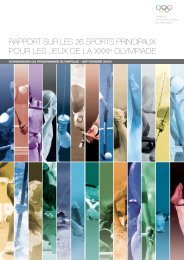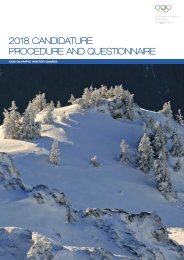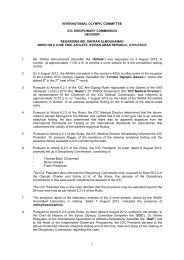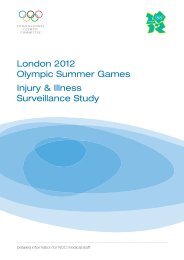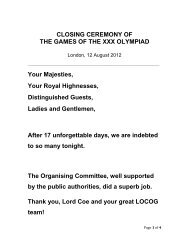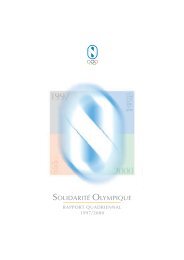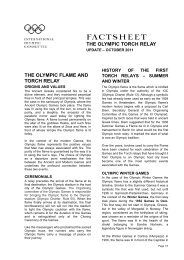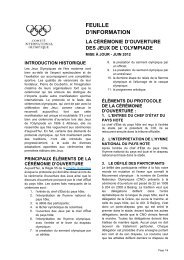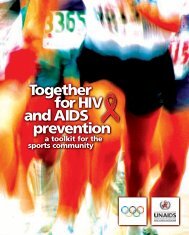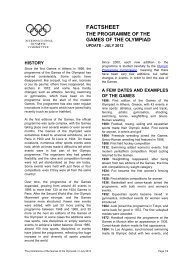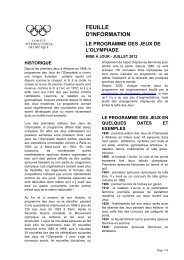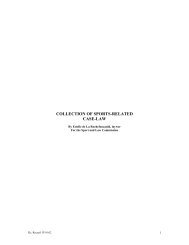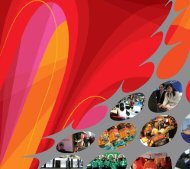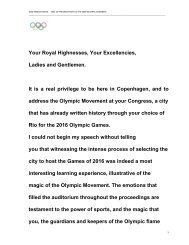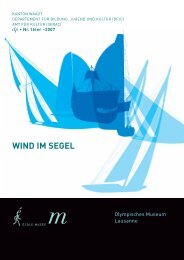8th WORLD CONFERENCE ON SPORT AND THE ENVIRONMENT
8th WORLD CONFERENCE ON SPORT AND THE ENVIRONMENT
8th WORLD CONFERENCE ON SPORT AND THE ENVIRONMENT
Create successful ePaper yourself
Turn your PDF publications into a flip-book with our unique Google optimized e-Paper software.
<strong>8th</strong> World Conference on Sport and the Environment<br />
International Cooperation and Development Department<br />
Report<br />
in action”. There is an application process where an innovation must be new to the Games, scale<br />
up a previous initiative, or involve a new collaboration.<br />
Topic: Inspirational Wrap-Up<br />
by Mr Adam Kreek,<br />
Gold Medallist in Men’s Rowing Eights, Canada<br />
Mr Kreek stated that the events we undertake—be they the Olympics or another—involve a great<br />
deal of preparation. While training, Mr Kreek thought about the VANOC mascots. Consequently,<br />
the team assigned spirit animals to the team members, such as cobra, polar bear or giraffe. One<br />
of the athletes was assigned the Snow Leopard spirit animal because the animal is rare and the<br />
athlete never showed up for practice. It was the case that the Flying Squirrel—a smaller athlete<br />
with less potential—always showed up to practice, while the leopard did not. When the time trial<br />
came, with the battle between the two athletes, the Flying Squirrel won the opportunity to be<br />
on the team. The lesson: Mr Kreek says that we all have opportunities within our grasp. We just<br />
need to reach for them. And this is the case with the SSET. He likes the UCI approach of “going<br />
beyond good intentions.” So, we must be “going beyond good intentions of setting up this plan<br />
for sustainability and implement it.”<br />
Mr Kreek admired how the US Navy centres its training on addressing what is in its sphere of<br />
control, rather than what is outside its control. Mr Kreek decided to do what he could do in his<br />
sphere of control on the sustainability front, and this was for the entire team to be carbon neutral<br />
for the Games. He raised the funds and the entire team went along with him. This involved a<br />
paradigm shift. And Mr Kreek had another paradigm shift during training when he was diagnosed<br />
with a herniated disk. So, instead of training, he focused on healing for three days a week. We<br />
also see a paradigm shift of practising sustainability.<br />
This is the lesson of “Inch by Inch”. According to Mr Kreek, in order to be faster than others, a<br />
rowing team must do three things:<br />
1. Must be as strong as possible<br />
2. Ensure that your stroke rate is as high as possible<br />
3. Ensure the length of stroke is as long as possible.<br />
The focus of his team was to have a length of stroke one inch longer than its competitors. An inch<br />
may not seem that long, but adding them up during the length of the race is about 221 inches,<br />
which is about 1 second, which was the length of victory. The lesson is that each of us has the<br />
ability to contribute an inch and this will grow as our infl uence reaches others in society.<br />
Key Message<br />
Athlete perspective on exercising sphere of infl uence in sport and communities.<br />
Page 24 / 80



